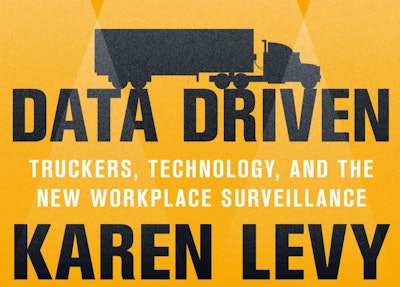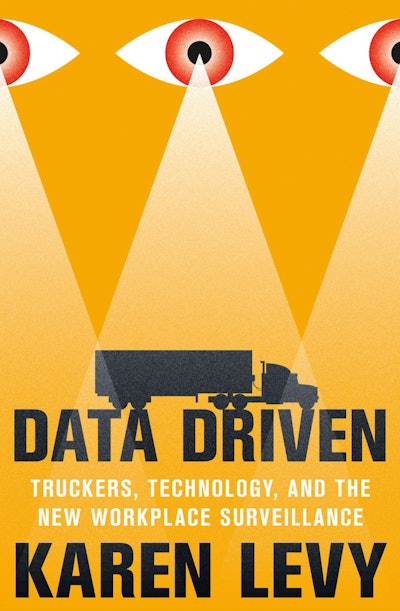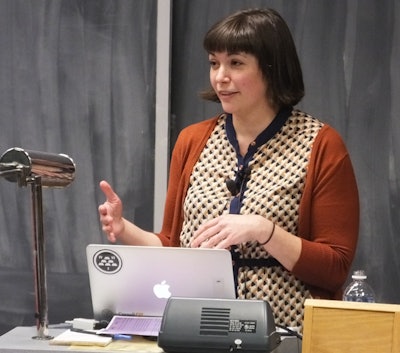
Few developments since President Jimmy Carter signed the Motor Carrier Act of 1980 have so riled and divided the American trucking industry as the mandatory installation of electronic logging devices in most heavy-duty trucks. Praised and pushed by carriers and regulators but reviled by most truckers, ELDs were positioned as a mandated step toward improving highway safety by combating driver fatigue.

We had a chance to speak with Levy, who is an associate professor of information science in Cornell's Ann S. Bowers College of Computing and Information Science. (The following has been edited for clarity and brevity.)
Truckers News: Interesting book. Quite the topic within the industry. What prompted you to write this?
Karen Levy: It was kind of a little bit of an unexpected twist in my life. I started the book when I was a graduate student. I was studying sociology, getting my PhD, and before that I had gotten a law degree. So I was really interested in the law and kind of how it functions, and especially the relationship between law and technology. So I feel it's increasingly common to kind of see governments or companies or other groups turn to technology as a way to enforce rules more strictly or more evenly. And I was kind of looking for a place where I could see that in practice, (to) see the change on the ground. And I heard a story on the radio one day about the ELD mandate.
This was back in 2011. So I didn't know anything about trucking. There were no truckers in my family. This was all new to me. But I read about it and I went that day to a truck stop near where I lived, just to see what it's like to talk to truck drivers, (and see) what kind of stories they have. And it was great.I was just hooked immediately. Truckers have great stories. I feel like there are a lot of people, including myself up to that point, who don't think a lot about the work that truckers do, but it's obviously just so essential to the way the economy functions and to everything getting where it needs to go. And I found them so easy to talk to and so generous with their time and their expertise. And so I just stuck with it.
TN: When you talked to drivers, did they cite personal experiences like that they were pressed by the clock, by ELD, and had to do things they wouldn't normally do?
Levy: I definitely saw that in my own conversations with truckers. In the book, I talk about other survey work that OIDA (Owner-Operator Independent Drivers Association) has done and some other secondary sources that bear this out. Of course, trucking is a big industry with several million people. And, people react differently and there are thousands of trucking companies. This is not meant to be an across-the-board indictment and to say, all companies do "X" or all drivers think "Y". But certainly that was a theme in some of what I saw. It was the sense that the ELD didn't give them the flexibility that they needed to do the work in a professional and safe way.
 Karn LevyCornell University
Karn LevyCornell University
TN: Did you hear from drivers any other objections in terms of the technology being an invasion of privacy, an invasion of their personal space? For a lot of the over-the-road drivers that's where they're living for their work week. Did you hear that as well?
Levy: Yes, that was really clear. I can come to my office and then I can leave, right? And there may be things I don't like about my office or about my workplace, but the line between my home and my work is a little bit clearer. As you point out for truckers, that's just not the case and has never been the case. So I think people experience it very personally when there are eyes in the cab that there weren't before because they live in the cab. They've been the captain of that ship for a long time. A lot of folks I think get into the industry because of that. They don't necessarily want to live, want to work in a place where someone's looking over their shoulder all the time. So you take these folks who have sort of selected into that and who are used to doing it in a particular way, and you say, 'Guess what? This is going to change in a very significant way.The two things that drivers very consistently said to me were that they felt the ELD either treated them like a criminal or treated them like a child. Those two comparisons came up over and over. And I think it's because the suggestion is 'We don't trust you to know the right thing to do.' Or 'We don't trust you to tell the truth. And so we'll use the surveillance to keep an eye on you.' That I think folks find very difficult to stomach.
TN: Did you hear from drivers that they thought that was at the root of the ELD mandate as opposed to safety?
Levy: Many drivers will tell you that the real problems in the industry are things like detention time, which is out of control or just the general churn in the industry because of the low pay and the conditions that folks deal with that discourage people from staying. Like it discourages the job from being one that you can really stay in for a long period of time. So the responses to that have been not to actually make the job better or more livable by doing things like building better truck parking or dealing with detention time in a real way, or, otherwise, just improving the lives and livelihoods that drivers face. (Or) through driver training and things like that.
(Instead, there are) these more policing-oriented strategies like the ELD. We're just going to watch what you're doing much more closely, but we're not going to actually change the things that made you break the rules to begin with. Because I don't think drivers break the rules because they want to, or because it's funny. I think they do it because they have to make a living, and I think we all depend on them to do that. I think for the public, it's easy for us to look the other way or to sort of blame drivers for things, but the public wants our Amazon packages when we want them right? And we don't have to pay more shipping costs. So I think it's probably time that we should acknowledge that the cost of that is people breaking the rules.The ELD doesn't change any of those things.
TN: Did you hear from drivers that parking aggravated the imposition of ELDs?
Levy: Yes. I think they see it all as being kind of a piece with each other. The public doesn't want truck stops, the public doesn't want truckers, the public doesn't want truckers using the bathroom. The public doesn't want to provide the infrastructure that truckers need to do their work and to do it safely. But if you don't provide that, it becomes much more difficult for folks to find a safe place to go at night. And, so a lot of times if they are exceeding their hours because they have to find somewhere to sleep. They can pull over, but that's not particularly safe for them or for the truck. So I think it's all pretty integrated. And, at least in my conversations with drivers, they see it all as being part of the same set of strategies, which is, 'Let's not actually provide any of the things that people need to do this work well and safely. Let's instead just kind of point fingers at drivers and say, you're not doing this right.' but there's not really a good way to do it if you don't provide those resources.
TN: It's been almost five years exactly since ELDs were mandated and went into trucks and were turned on. Have ELDs lived up to what the law intended, do you think?
Levy: If you look at the justifications that were being used for ELDs, I think it has always been about safety and fatigue; really reasonable and justifiable rationales. We all want safer roads. We all want fewer truckers to die in accidents. I think everybody's aligned in their views on that, but I think even on their own terms, ELDs have not shown to be a solution to that problem. There are some studies that I cite in the book, like quantitative studies by professors at different business schools analyzing some of the safety data and crash data in the years after the mandate, and they find that truck-related fatalities went up in that year. I think they hit a 30-year high, if I remember correctly. There's no real demonstrable safety impact that seems positive. And, a lot of people, I think are of the view, and this is definitely born out from the folks I talked to as well, that that's because the ELD is sort of premised on a false understanding of how it is that the timekeeping regulations function. And if you make them really rigid, which is what the E L D does, you take out a lot of the wiggle room that truckers really rely on to make a living while also being safe. So they feel a lot more pressure to stay on the road even past the point that they should and they speed, or they don't stop to fix something that should, they should stop to fix because they just don't have the time. The flexibility of the paper log regime kind of let them do that when they needed to do it. And, we sort of removed that with the ELD.
TN: Do you see any kind of change ahead or are ELDs here for the long haul?
Levy: I don't realistically expect that the ELD mandate is going to get rolled back anytime soon. And to be honest, I'm not sure that that's the argument that my book is trying to make. I think instead it's to solve economic problems with economic solutions, not with technological solutions because the technological solution is just never going to be able to address those root causes. I think there may even be a role for ELDs if you are also addressing the problems that lead drivers to drive a crazy number of hours. If you can address some of those root causes, maybe there's a reason to still keep ELDs in the picture.
I certainly don't want the people to come away thinking that my argument is, let's go back to the status quo, which is paper logs. I think doing that would not be a solution to any of the problems in the industry. Some drivers I'm sure would be happy with that, but my view after talking to a lot of folks is that that doesn't actually make this the job that it should be or make it the job that people have come to expect.
TN: Are there other technologies that are of concern to drivers besides the ELD?
Levy: One thing that became really clear to me, and again, drivers know this, is that when you talk about the ELD, a lot of times the ELD is like kind of a misnomer for something much broader. So one thing that became really clear is that the ELD that the government requires often becomes like a backbone, or a Christmas tree or something that you can hang all of these other capabilities on. So (it's) a bunch of different fleet management, performance monitoring stuff like keeping track of fuel efficiency and speed and what time the driver starts in the morning and just all these performance things that are of interest not to the government, but to the driver's employer. It became really clear to me quickly that I was sort of thinking about the ELD as really just a regulatory technology, but the device itself actually encompasses this much broader range of surveillance.











